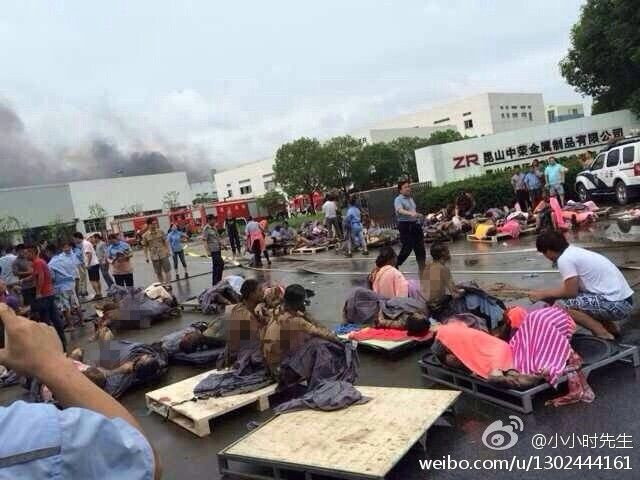Zhongrong Metal Parts Factory Explosion: How Does It Affect General Motors In China?

Faced with recalling millions of cars in the U.S. and a raft of lawsuits for a faulty ignition switch, General Motors Co. is not having a great year. But blame for Saturday’s factory explosion in Kunshan City, China, isn’t likely to be laid at GM’s doorstep.
The issue underscores not only GM’s relationship with its massive web of partners and suppliers in the world’s largest auto market but also raises questions about the safety of China’s factory supply chain and how much responsibility foreign companies like GM, Apple Inc. (NASDAQ:AAPL) and McDonald’s Corp. (NYSE:MCD) have to share for problems in their multi-tiered supply chains.
General Motors Co. (NYSE:GM) acknowledged on Sunday that Zhongrong Metal Products Co. was a so-called “Tier-2” supplier, meaning the company produced its aluminum alloy wheel hubs and then passed them to GM’s “Tier-1” provider, CiTiC Dicastal Wheel Manufacturing Co., Ltd., based in Qinhuangdao city.
"We are working with our supplier to establish alternate processing capability," GM told Reuters after the accident, which killed at least 75 workers and injured at least 186. The company said it had no direct dealings with Zhongrong, where workers had been complaining about dangerous buildup of metal dust in the air.
If enough aluminum dust builds up in the air of a confined workplace, it can easily ignite when it comes in contact with any source of fire, such as an electric spark from a machine or the flame from a cigarette lighter. The U.S. Chemical Safety Board advises workplaces with a high level of combustible particles in the air to have adequate ventilation and protective gear.
Combustible air particles from many types of materials – including aluminum, magnesium, coal dust and even wheat flour – are common industrial hazards in China and worldwide. In 2011, a similar metallic-dust explosion killed 16 workers at a Foxconn plant manufacturing parts for Apple’s iPad 2.
In a remarkably similar incident to Saturday’s accident, an aluminum-dust buildup caused an explosion at a plant making aluminum alloy automotive wheels that killed one worker in Huntington, Indiana, in 2003.
Labor rights groups have argued that companies should be responsible for safety across their supply chains, be they in China or in the United States. The use of multi-tiered supply chains has been one of the main issues in a series of garment factory accidents in Bangladesh.
"Safety measures like ventilation systems should have prevented such accumulation of dust particles. This tragedy is a result of lax safety standards in the workplace," said New York-based China Labor Watch, which contends that GM shares responsibility for this accident.
McDonald’s and other fast food companies recently faced their own supply chain problems in China when they discovered a major local meat supplier was providing expired beef and chicken.
General Motors has a big presence in China – second only to Volkswagen AG (FRA:VOW3) – and GM sells more vehicles there than in the United States. The company’s Chinese supply chain is massive and connected to its primary local vehicle manufacturing partners. GM has 10 joint ventures in China, including three with local car companies, underscoring the intertwined nature of the Chinese automotive sector.
Shanghai GM is the company’s largest Chinese operation. It produces several Buick, Cadillac and Chevrolet vehicles with Shanghai Automotive Industry Corp. Group (SAIC), China’s largest state-owned domestic car company. SAIC-GM-Wuling Automobile manufactures Wuling light trucks and vans and the new Baojun 730 family van released last week in China. The company also partners with FAW, China’s third largest domestic automaker under FAW-GM Light Duty Commercial Vehicle Co. Ltd.
In an interview with International Business Times in June about Tesla Motors Inc. (NASDAQ:TSLA) and other companies working to weed out conflict minerals from their supply chains, Maisam Abbasi, an industrial engineer at Sweden’s Lund University who specializes in sustainable supply chain logistics, said bringing together producers and suppliers across a global, multi-tier supply chain is a good first step toward sustainability and ethical sourcing practices.
© Copyright IBTimes 2024. All rights reserved.






















